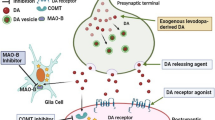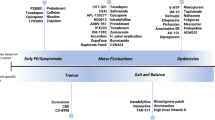Abstract
This narrative review examines the effects of drug therapy on the natural history of Parkinson’s disease. In terms of modifying the underlying disease process, it is possible that immediate therapy, rather than deferred treatment, can have a positive effect on the underlying disease process. However, it is unlikely that drug therapy has changed mortality from the condition and there is no evidence that it can delay the onset of non-motor features such as dementia and falls. The beneficial effects of drug therapy on the motor symptoms of Parkinson’s disease are unquestionable, but these are at the expense of short-term dopaminergic side effects, long-term motor complications, and impulse control disorders. Major questions remain regarding which initial therapeutic approach should be taken which may possibly be answered by the ongoing PD MED trial. The beneficial effects of drug therapy on the motor features of Parkinson’s disease have had a fundamental impact on the suffering of patients. The mainstay of these therapies continues to be levodopa, although it is now used at lower doses than in the past and in combination with other drug classes.







Similar content being viewed by others
References
Clarke CE (1993) Mortality from Parkinson’s disease in England and Wales 1921–1989. J Neurol Neurosurg Psychiatry 56:690–693
Clarke CE (1995) Does levodopa therapy delay death in Parkinson’s disease? A review of the evidence. Mov Disord 10(3):250–256
Clarke C (2000) Mortality from Parkinson’s disease. J Neurol Neurosurg Psychiatry 68(2):254–255
Hoehn MM, Yahr MD (1967) Parkinsonism: onset, progression, and mortality. Neurology 17:427–442
Aarsland D, Andersen K, Larsen JP, Lolk A, Kragh-Sorensen P (2003) Prevalence and characteristics of dementia in Parkinson disease: an 8-year prospective study. Arch Neurol 60(3):387–392
Fahn S, Oakes D, Shoulson I, Kieburtz K, Rudolph A, Lang A et al (2004) Levodopa and the progression of Parkinson’s disease [see comment]. N Engl J Med 351(24):2498–2508
Shoulson I, Oakes D, Fahn S, Lang A, Langston JW, LeWitt P et al (2002) Impact of sustained deprenyl (selegiline) in levodopa-treated Parkinson’s disease: a randomized placebo-controlled extension of the deprenyl and tocopherol antioxidative therapy of Parkinsonism trial. Ann Neurol 51(5):604–612
Parkinson Study Group (2004) A controlled, randomised, delayed-start study of rasagiline in early Parkinson disease. Arch Neurol 61:561–566
Olanow CW, Rascol O, Hauser R, Feigin PD, Jankovic J, Lang A et al (2009) A double-blind, delayed-start trial of rasagiline in Parkinson’s disease. N Engl J Med 361(13):1268–1278
Clarke CE (2008) Are delayed-start design trials to show neuroprotection in Parkinson’s disease fundamentally flawed? Mov Disord 23(6):784–789
Stowe RL, Ives NJ, Clarke C, van Hilten J, Ferreira J, Hawker RJ et al (2008) Dopamine agonist therapy in early Parkinson’s disease. Cochrane Database Syst Rev (2):CD006564
Ives NJ, Stowe RL, Marro J, Counsell C, Macleod A, Clarke CE et al (2004) Monoamine oxidase type B inhibitors in early Parkinson’s disease: meta-analysis of 17 randomised trials involving 3525 patients. BMJ 329(7466):593
Weintraub D (2008) Dopamine and impulse control disorders in Parkinson’s disease. Ann Neurol 64(Suppl 2):S93–S100
Schapira AH, Albrecht S, Barone P, Comella CL, McDermott MP, Mizuno Y et al (2010) Rationale for delayed-start study of pramipexole in Parkinson’s disease: the PROUD study. Mov Disord 25:1627–1632
Acknowledgments
The author would like to thank Drs. L. Pallan, M. Connock, and Prof. C. Hyde for their help in preparing Figs. 1 and 2 and Natalie Ives and Smitaa Patel in the University of Birmingham Clinical Trials Unit for the PD MED data.
Conflict of interest
Professor Clarke has received honoraria for lectures, travel expenses for conferences, and unrestricted educational grants from Boehringer Ingelheim, GlaxoSmithKline, Lundbeck, Orion Pharma, Novartis, Teva, UCB, and Valeant.
Author information
Authors and Affiliations
Corresponding author
Rights and permissions
About this article
Cite this article
Clarke, C.E. Has drug therapy changed the natural history of Parkinson’s disease?. J Neurol 257 (Suppl 2), 262–267 (2010). https://doi.org/10.1007/s00415-010-5716-z
Published:
Issue Date:
DOI: https://doi.org/10.1007/s00415-010-5716-z




